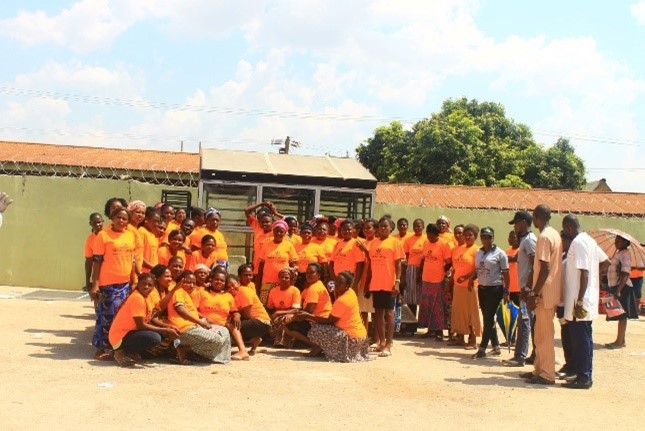Over 45% of Nigerian households lack grid electricity. Creeds has deployed over 1,000 Standalone Home Solar systems, totaling over 1MWp across ten locations, focusing on SMEs. To address usage discrepancies, Creeds introduced mesh-grid systems for power sharing, enabling varied use and improving access in remote areas. Creeds provides an energy-as-a-service model, making solar power affordable. Their recent project in Bassa, Nasarawa State, delivered 24-hour solar energy to 50 households, enhancing energy access with 10kW solar PV and 51.2kWh battery storage.
Mesh Grids for Rural Cluster Communities

Over 45% of Nigerian households do not have access to grid electricity. With the decentralized off-grid energy expanding in Nigeria, Creeds had deployed over 1,000 Standalone Home Solar (SHS) systems totalling over 1MWp across ten locations with a strong focus on small to medium Enterprises (SMEs). Since their previous installation, Creeds has identified 2 types of users: (1) High-powered prosumers and local businesses, and (2) Low-powered residential households primarily using mobile charging and lights.
The usage of the lower-powered households was not enough to commercially justify the installation of mini-grids in many areas, while the high-power users often had excess electricity capacity that they did not always use. However, when looking at the options for smaller SHS providers on the market, no other technology providers offered the ability to share power from the high-powered to low-powered users.
Mesh-grid as a means of enabling power sharing with other households. Furthermore, since the mesh-grid kits allowed for a power output of 1.2kW, it would allow for varied use from residential to productive needs. Mesh mini-grid solar systems are particularly suitable for rural areas or remote communities where access to the main grid is limited or unreliable. They offer an affordable and sustainable energy solution, reducing dependence on traditional fossil fuel-based generators and improving the quality of life for the communities they serve. CREEDs offer the community customer an energy-as-a-service model – payment for electricity used per unit; the customers only pay for the electricity supply. CREEDs own the assets and distribution line. This makes energy access affordable to the community.
Creeds Energy is one of Nigeria’s leading solar energy services and solutions providers, with a vision to be recognized as one of the top 5 renewable energy companies in West Africa, distinguished by quality, innovation and professionalism. They aim to realize the development of a green economy with low emissions and social inclusivity through the efforts of their knowledge-driven team and network of internationally qualified experts.
Creeds Energy has energized 50 households in Bassa, Nasarawa State, with 24-hour solar energy access using mesh grids from Okra Solar. The project was installed in five days, with households generating clean power instantly. The total project has 10kW of solar PV generation, 51.2kWh of battery storage capacity (LFP), and supplies an average daily load of 460Wh/day, sized for 99% network uptime.
Their target market is small businesses located in underserved on-grid areas with unreliable power supply mostly in urban and unconnected peri-urban and rural communities with potential or productive activities.
- By sharing excess power, Creeds was able to get an additional 46 households energized than originally planned – almost double the original target.
- Creeds Energy deploys a 50-household mesh-grid pilot in Nasawara state, Nigeria
- Among the higher productive centers energized in the rollout were a Primary Healthcare Centre (PHC), a mosque, a barber shop and a phone-charging shop. These centers previously ran on diesel generator sets; now they can save money and power themselves with 100% renewable energy.
- The cost per connection for this 50-household pilot was less than $1,000/household, which represents an estimated 30% cost saving compared to delivering the same amount of power (460Wh/day) using a traditional centralized mini-grid.
- The project was installed over five days with a team of 20 people, including residents.
- Mesh-grid energizes community in Nasarawa State at 30% cost saving compared with mini-grid
- The mesh-grid kits allowed for a power output of 1.2kW which would allow for varied use from residential to productive needs.
- Creeds installed Okra’s XL Kits targeting productive centers and high-powered users and connected them to nearby lower-powered users so that they could share power. By sharing excess power, Creeds can get an additional 46 households energized than originally planned – almost double the original target. This created a so-called Hub-and-Spoke topology.
CREEDS Energy also supports community women by providing Productive Use Equipment (PUE) like solar dyers, SHS, milling machines, and training to increase electricity utilization, increase income for women and empower youths.
CREEDs Energy is also training the locals in the community mostly youths, who they engage as connectors, customer supports, and light maintenance services in the community.
The scale-up phase of the project will see Creeds electrifying an additional 910 households and businesses spread across the Bassa community and the nearby market area. These areas currently lack access to electricity altogether or are predominantly using diesel generators as a primary source of electricity.
The scale-up project will also energize a mosque and a health care centre, creating a green hub in the centre of Nasarawa State. In 2015, the United Nations set out to achieve the Sustainable Development Goals by 2030, including SDG7: clean and affordable energy access for all. Nigeria still has about 90 million people without basic energy access, but projects like this one in Bassa are an example of how local companies are using innovative approaches to make an impact.
Creeds has a track record of deploying successful projects and is aiming to rapidly expand its mesh-grid portfolio to 910 households with the financial support of the Rural Electrification Agency’s Solar Power Naija program.
Partnership with Okra has ushered in endless possibilities for delivering energy access to the multitude of households and businesses in need. The first of many, this project showcases the potential of Creeds Litedey model with emerging technologies and solutions aimed at powering prosperity.

